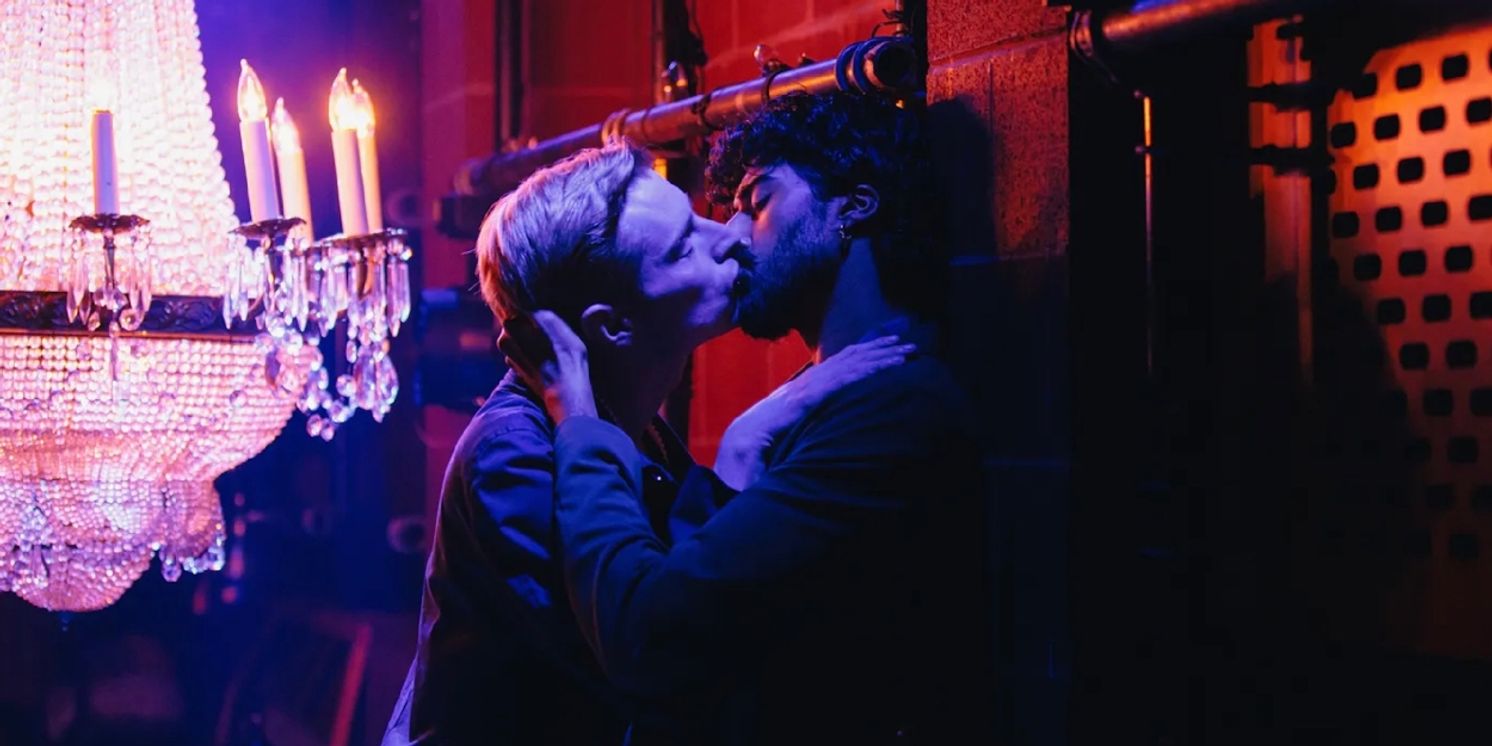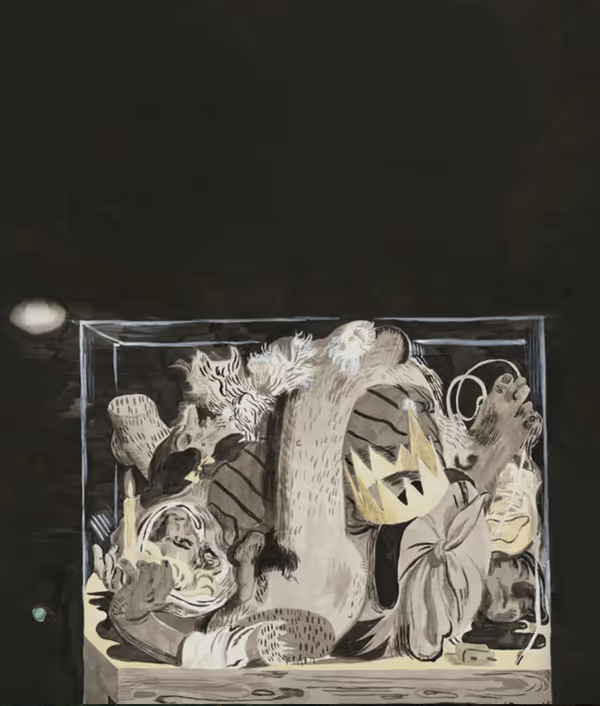Review Roundup: PRINCE F****T at Playwrights Horizons
Prince F****t will run through July 13 at Playwrights Horizons.

Jordan Tannahill's Prince Faggot, directed by Shayok Misha Chowdhury, just made its world premiere at Playwrights Horizons, starring Rachel Crowl, K. Todd Freeman, David Greenspan, Mihir Kumar, John McCrea, and N’yomi Allure Stewart.
In this meta-theatrical satire, an ensemble of queer, trans, and nonbinary performers reckon with how the forces of power, privilege, and colonization play upon their lives as the playwright offers a central provocation: what if queer people dared to imagine a future monarch having a life that resembled their own?
Check out what the critics are saying about the new play...
 Jesse Green, New York Times: That’s a lot of story to cram into two hours, and in some ways I’ve barely scratched the hot surface of Tannahill’s ambition, which far exceeds the zany rom-com kitsch of Matthew López’s “Red, White & Royal Blue” and other gay royal fantasias. But if the author’s focus is too broad for his plot, with detours into AIDS and addiction creating a sort of disputatious blur, Chowdhury’s staging is as lucid as an oratorio. He perfectly sets up each actor for bravura solos that make their group scenes feel lushly choral.
Jesse Green, New York Times: That’s a lot of story to cram into two hours, and in some ways I’ve barely scratched the hot surface of Tannahill’s ambition, which far exceeds the zany rom-com kitsch of Matthew López’s “Red, White & Royal Blue” and other gay royal fantasias. But if the author’s focus is too broad for his plot, with detours into AIDS and addiction creating a sort of disputatious blur, Chowdhury’s staging is as lucid as an oratorio. He perfectly sets up each actor for bravura solos that make their group scenes feel lushly choral.
 Jackson McHenry, Vulture: The play comes most alive in action. Shayok Misha Chowdhury, glasslike and precise in his work in Public Obscenities, directs Tannahill’s drama like it takes place in the murky dark room of a club. He’s guided McCrea and Kumar into a gently knowing intimacy, both in unspoken communications they make with each other under George’s parents’ scrutiny and in their richly expressive sex scenes. The audience’s phones are placed in Yondr pouches for good reason.
Jackson McHenry, Vulture: The play comes most alive in action. Shayok Misha Chowdhury, glasslike and precise in his work in Public Obscenities, directs Tannahill’s drama like it takes place in the murky dark room of a club. He’s guided McCrea and Kumar into a gently knowing intimacy, both in unspoken communications they make with each other under George’s parents’ scrutiny and in their richly expressive sex scenes. The audience’s phones are placed in Yondr pouches for good reason.
 Robert Hofler, The Wrap: It doesn’t mean anything to call “Prince Faggot” the best play of the 2025-26 theater season, which is only about six weeks old. It does mean something to put Tannahill’s play in the same august company as Bess Wohl’s “Liberation,” Branden Jacobs-Jenkins’ “Purpose” and Emil Weinstein’s “Becoming Eve,” all of which opened earlier this year. As with these American writers, Tannahill, a Canadian, is a great storyteller, and he runs fast and furiously with this riveting narrative: What happens if a contemporary prince comes out as gay and marries another man when he’s finally king?
Robert Hofler, The Wrap: It doesn’t mean anything to call “Prince Faggot” the best play of the 2025-26 theater season, which is only about six weeks old. It does mean something to put Tannahill’s play in the same august company as Bess Wohl’s “Liberation,” Branden Jacobs-Jenkins’ “Purpose” and Emil Weinstein’s “Becoming Eve,” all of which opened earlier this year. As with these American writers, Tannahill, a Canadian, is a great storyteller, and he runs fast and furiously with this riveting narrative: What happens if a contemporary prince comes out as gay and marries another man when he’s finally king?
 Tim Teeman, Daily Beast: Prince F****t ends with its most resonant monologue, interrogating notions of power and identity—and again underlining, whatever outrage and controversy might come to bubble around it, that this is not a play about Prince George’s sexuality or the royal family at all, but those marginalized and long considered to be without power finally, proudly, exercising and voicing it.
Tim Teeman, Daily Beast: Prince F****t ends with its most resonant monologue, interrogating notions of power and identity—and again underlining, whatever outrage and controversy might come to bubble around it, that this is not a play about Prince George’s sexuality or the royal family at all, but those marginalized and long considered to be without power finally, proudly, exercising and voicing it.
 Dan Rubins, Slant: Prince Faggot, from its title on down, seems designed to attract the same sort of Daily Mail headlines that plague its characters: “Softcore Off-Broadway Play Sexualizes Royal Minor” and so forth. The play’s provocations may attract audiences—the run is mostly sold-out, presumably on the basis of its title alone (marketing doesn’t disclose the subject matter)—and they’ll be rewarded by Tannahill’s subverted expectations when they attend.
Dan Rubins, Slant: Prince Faggot, from its title on down, seems designed to attract the same sort of Daily Mail headlines that plague its characters: “Softcore Off-Broadway Play Sexualizes Royal Minor” and so forth. The play’s provocations may attract audiences—the run is mostly sold-out, presumably on the basis of its title alone (marketing doesn’t disclose the subject matter)—and they’ll be rewarded by Tannahill’s subverted expectations when they attend.
 Kyle Turner, New York Theatre Guide: Prince Faggot’s ambitions thus feel somewhat paradoxical: humanize and make real a figure who can ultimately only exist as a cultural imaginary, while also interrogate the allure of identification and desire to relate with/to such quasi-mythological figures, requiring a kind of academic removal. A whiff of Carol and experimental Bob Dylan biopic I’m Not There director Todd Haynes can be smelt from the various acknowledgments of how these characters’ lives are mediated – by the press, by the mythology – for the audience and for one another.
Kyle Turner, New York Theatre Guide: Prince Faggot’s ambitions thus feel somewhat paradoxical: humanize and make real a figure who can ultimately only exist as a cultural imaginary, while also interrogate the allure of identification and desire to relate with/to such quasi-mythological figures, requiring a kind of academic removal. A whiff of Carol and experimental Bob Dylan biopic I’m Not There director Todd Haynes can be smelt from the various acknowledgments of how these characters’ lives are mediated – by the press, by the mythology – for the audience and for one another.
 Michael Sommers, New York Stage Review: An uneven drama, Prince Faggot proves scarcely as meaningful about present and future queer existence as its author intends, although it can be surprisingly entertaining in spots. The swift staging by Chowdhury and solid performances by his ensemble help to make it all seem convincing. Sharp costumes by Montana Levi Blanco, such as Jacqueline’s glam gold and white pants suit (a snap at the Windsor clan’s legendary “men in gray suits”), flexible yet elegant scenic design by David Zinn, effective sound design and music by Lee Kinney and Isabella Byrd’s glimmering lighting appropriately give the production a jewel box quality.
Michael Sommers, New York Stage Review: An uneven drama, Prince Faggot proves scarcely as meaningful about present and future queer existence as its author intends, although it can be surprisingly entertaining in spots. The swift staging by Chowdhury and solid performances by his ensemble help to make it all seem convincing. Sharp costumes by Montana Levi Blanco, such as Jacqueline’s glam gold and white pants suit (a snap at the Windsor clan’s legendary “men in gray suits”), flexible yet elegant scenic design by David Zinn, effective sound design and music by Lee Kinney and Isabella Byrd’s glimmering lighting appropriately give the production a jewel box quality.
 Alex Eichholtz, Theater Pizzazz: Contrasting joy, love, and freedom of expression with anger, resentment, and loss, Prince Faggot fully encompasses the queer experience. It forces an audience to consider not only the enjoyable parts but likewise the parts hidden from oneself and/or others. Laced throughout Crow’s monologue is a mixture of kindness and fury that offers a profound truthfulness. “You will never know that wound,” she says. “You may think you know, but you will never know. And I resent that you’ll never know. But I guess I’m also thankful that you’ll never know.”
Alex Eichholtz, Theater Pizzazz: Contrasting joy, love, and freedom of expression with anger, resentment, and loss, Prince Faggot fully encompasses the queer experience. It forces an audience to consider not only the enjoyable parts but likewise the parts hidden from oneself and/or others. Laced throughout Crow’s monologue is a mixture of kindness and fury that offers a profound truthfulness. “You will never know that wound,” she says. “You may think you know, but you will never know. And I resent that you’ll never know. But I guess I’m also thankful that you’ll never know.”
 Jude Cramer, INTO: The show has much more to offer than laughs. It’s compelling: family drama is family drama, even (or especially) when the royal family is the household in question. It’s profound: meditations on the intersection of privilege and queerness are well worth your attendance even if you’re not a royal yourself. It’s erotic: the play’s explicit scenes bring a rare level of authenticity to queer kink. The thoughtful intimacy direction by UnkleDave’s Fight-House proves that well-executed, intentional sex scenes across media can — and should! — hold narrative importance, despite what modern-day puritans may espouse online.
Jude Cramer, INTO: The show has much more to offer than laughs. It’s compelling: family drama is family drama, even (or especially) when the royal family is the household in question. It’s profound: meditations on the intersection of privilege and queerness are well worth your attendance even if you’re not a royal yourself. It’s erotic: the play’s explicit scenes bring a rare level of authenticity to queer kink. The thoughtful intimacy direction by UnkleDave’s Fight-House proves that well-executed, intentional sex scenes across media can — and should! — hold narrative importance, despite what modern-day puritans may espouse online.
 Lane Williamson, Exeunt: It’s an intentionally messy, ragged play and it needs to be. I’ve been wrestling with it for days and am still not even sure that I’ve landed on an “opinion” about it. Playwrights Horizons and Soho Rep are to be applauded for programming something like this – it takes confidence and intelligence to read this play and see what it could be, even if it’s not entirely successful.
Lane Williamson, Exeunt: It’s an intentionally messy, ragged play and it needs to be. I’ve been wrestling with it for days and am still not even sure that I’ve landed on an “opinion” about it. Playwrights Horizons and Soho Rep are to be applauded for programming something like this – it takes confidence and intelligence to read this play and see what it could be, even if it’s not entirely successful.
 Thom Geier, Culture Sauce: In the end, Tannahill is less concerned with gossip about a gay royal than in the isolation that any LGBTQ+ person faces in carving a space for themselves after growing up in the constraining embrace of a straight (and straitlaced) family. While Prince Faggot spends most of its time as a kind of speculative work of royal fan fiction, Tannahill cunningly gives the last word to Stewart — who shares a version of her personal story while questioning the very foundations of the drama in which she’s featured. Why should we care about some far-off prince and his supposedly divine claim to the throne? Isn’t the fundamental truth of queer lives the ability to shed the costumes that our parents have given us, and sometimes even the bodies, and to forge a life for ourselves that reflects our true identities?
Thom Geier, Culture Sauce: In the end, Tannahill is less concerned with gossip about a gay royal than in the isolation that any LGBTQ+ person faces in carving a space for themselves after growing up in the constraining embrace of a straight (and straitlaced) family. While Prince Faggot spends most of its time as a kind of speculative work of royal fan fiction, Tannahill cunningly gives the last word to Stewart — who shares a version of her personal story while questioning the very foundations of the drama in which she’s featured. Why should we care about some far-off prince and his supposedly divine claim to the throne? Isn’t the fundamental truth of queer lives the ability to shed the costumes that our parents have given us, and sometimes even the bodies, and to forge a life for ourselves that reflects our true identities?
 Tulis McCall, Front Row Center: This is a rich ensemble. Rich in talent and rich in generosity toward one another and to us. Chowdhury’s direction is seamless. The action is deceptive because it is choreography on so many levels. The scene changes are more akin to hand-offs in a relay. And no one drops the baton. Mention must be made of the many characters that almost every performer takes on with what can only be called raw glee. Don’t let the title, “Prince Faggot”, put you off. Fasten your seatbelts and open your mind. You will be surprised at how much new information you can stuff into that noggin of yours.
Tulis McCall, Front Row Center: This is a rich ensemble. Rich in talent and rich in generosity toward one another and to us. Chowdhury’s direction is seamless. The action is deceptive because it is choreography on so many levels. The scene changes are more akin to hand-offs in a relay. And no one drops the baton. Mention must be made of the many characters that almost every performer takes on with what can only be called raw glee. Don’t let the title, “Prince Faggot”, put you off. Fasten your seatbelts and open your mind. You will be surprised at how much new information you can stuff into that noggin of yours.

Average Rating: 78.3%
- To read more reviews, click here!
- Discuss the show on the BroadwayWorld Forum
Reader Reviews


|
Powered by
|
Videos



